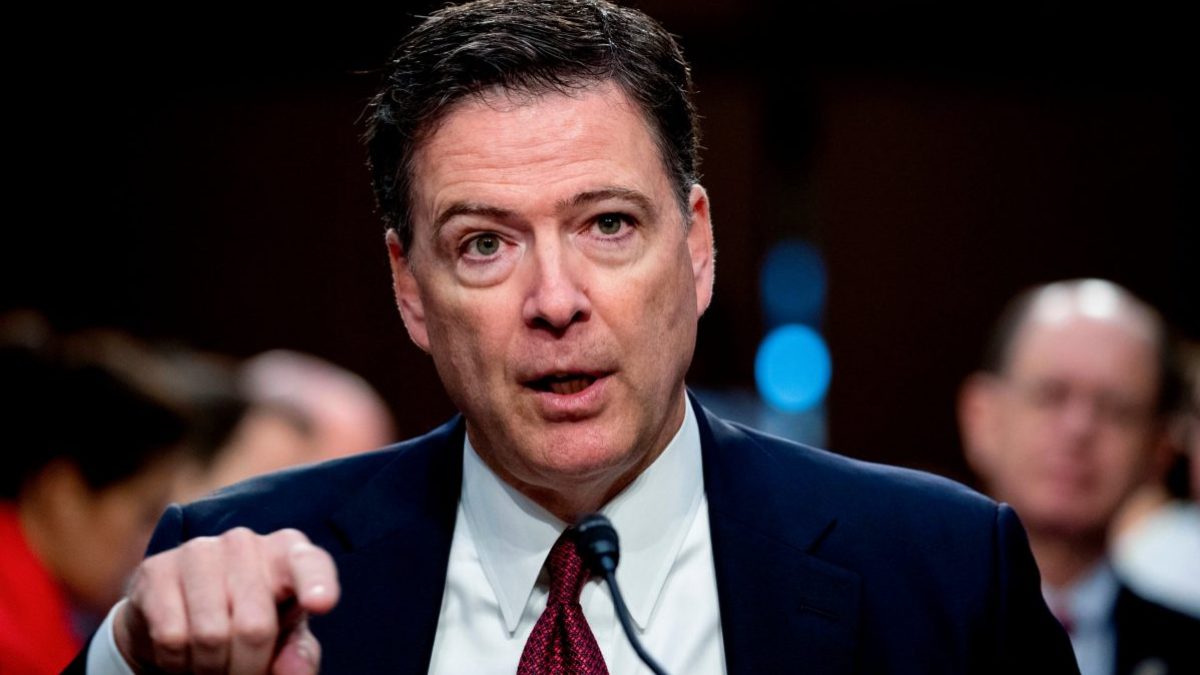
The US president has regularly criticised Comey over his handling of an investigation into Russian interference in the 2016 election
Former FBI Director James Comey has been indicted on criminal charges of false statements and obstruction, as Donald Trump escalates his campaign against political adversaries.
The US president hailed the indictment, writing “JUSTICE IN AMERICA!” on his social media platform, TruthSocial.
In a video statement, Comey said his “heart is broken for the Department of Justice but I have great confidence in the federal judicial system, and I’m innocent. So let’s have a trial.”
The indictment makes Comey the first former senior government official to face prosecution in connection with one of Trump’s biggest grievances: the investigation into Russian interference in the 2016 election.
If convicted, he faces up to five years in prison.
Trump and his supporters have long derided the Russian investigation as a “hoax” and a “witch hunt” despite multiple government reviews showing Moscow interfered to advantage the Republican’s campaign.
Trump, who fired Comey early into his first presidency in 2017, has regularly criticised the former FBI chief over his handling of the investigation.
On Thursday night, Trump said Comey “has been so bad for our Country, for so long, and is now at the beginning of being held responsible for his crimes against our Nation. MAKE AMERICA GREAT AGAIN!”
In 2018, after he was fired, Comey called Trump “morally unfit” for office.
In his memoir, A Higher Loyalty, he wrote: “This president is unethical, and untethered to truth and institutional values. His leadership is transactional, ego driven and about personal loyalty.”
Since Trump returned to office in January, his Justice Department has been examining Comey’s 2020 testimony before the Senate Judiciary Committee, in which he addressed criticisms of the Russia investigation and denied that he had authorised disclosures of sensitive information to the media.
The indictment came after Trump appeared to urge his Attorney General Pam Bondi to prosecute the former FBI director and other perceived political enemies, writing on social media: “JUSTICE MUST BE SERVED, NOW.”
“No one is above the law,” Bondi said in a post on X shortly after the news broke.
Without specifically mentioning Comey, she added: “Today’s indictment reflects this Department of Justice’s commitment to holding those who abuse positions of power accountable for misleading the American people. We will follow the facts in this case.”
The case against Comey, who served as FBI director from 2013 until 2017, marked the starkest example of the Trump administration using its law enforcement power against a prominent critic after the president promised retribution during his successful 2024 election campaign.
Comey’s firing led to the appointment of another former FBI chief, Robert Mueller, being appointed as a special counsel to take charge of the Russia probe, which unearthed numerous contacts between the campaign and Russian officials but concluded that there was not enough evidence to establish a criminal conspiracy.
Trump repeatedly attacked the investigation as a “witch hunt,” and his second administration has sought to undermine conclusions by US intelligence and law enforcement agencies about Russian interference in the 2016 presidential election.
A Justice Department internal watchdog found evidence of numerous errors but no political bias concerning the FBI’s opening of the investigation.
Republicans have long claimed that the investigation was intended to undermine Trump’s first administration.
The Justice Department’s internal watchdog in a 2019 report faulted Comey for asking a friend to give memos detailing Comey’s one-on-one interactions with Trump to the New York Times.
The Justice Department during Trump’s first term declined to pursue criminal charges against Comey.
The case behind Comey’s charges
US prosecutors alleged Comey made false statements when he stood behind 2017 Senate testimony, which was investigating errors the FBI made in the early stages of the Russia probe.
In that testimony Comey said he did not disclose or approve the disclosure of information to the media about FBI investigations into either Trump or Hillary Clinton.
Prosecutors claim that statement was false because Comey allegedly authorised a leak related to an FBI investigation.
The indictment does not name the investigation, but it appears to relate to a Wall Street Journal report from October 2016 about an FBI probe into the Clinton family’s charitable foundation.
Republican US Senator Ted Cruz questioned Comey at the hearing about the former FBI chief’s deputy, Andrew McCabe, who has admitted to being a source for the report.
Comey has said that he did not authorise the disclosure and was not aware of it before the article was published.
Republicans questioned Comey about the FBI’s use of an unverified and now largely discredited dossier of reports and rumours about Trump’s ties to Moscow.
FBI investigators used that dossier to secure a warrant to secretly surveil a former Trump campaign aide.
Comey acknowledged errors in the warrant application were concerning, but defended the Russia investigation, arguing it was “essential that it be done” and “in the main conducted in the right way”.
The investigation, which was taken over by Special Counsel Robert Mueller after Comey’s 2017 firing, unearthed numerous contacts between the Trump campaign and Russian officials but did not establish evidence of a conspiracy to influence the 2016 election.
With agencies
